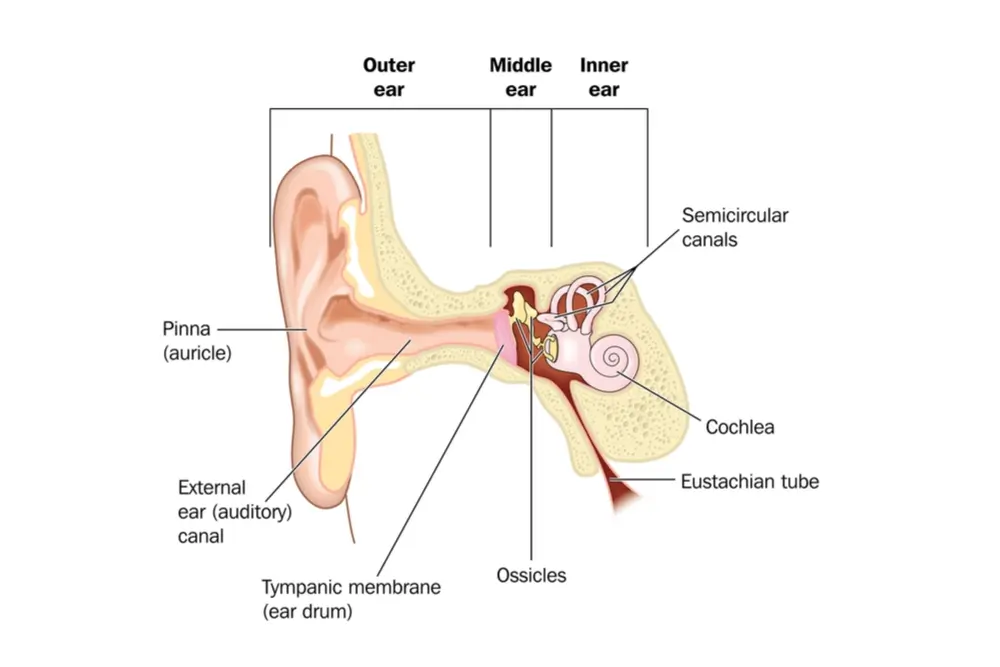What causes blocked ears?
Medically Reviewed by Dr Richard Bennett
Last updated on 11.06.2024
What causes blocked ears?
People often attend the doctor complaining of blocked ears. There are several common causes of blocked ears that a doctor will usually check for. Here are some of the most frequent issues.
Ear wax
- Glands in the skin inside your ears naturally make wax (also called cerumen), which protects the ear canal by trapping germs and dust.
- Usually the wax makes its way slowly outwards to the opening of the ear, and the ears are naturally “cleaned”. However, sometimes wax builds up, leading to a sense of blocked ears, and occasionally discomfort, irritation or tinnitus (buzzing or ringing in the ears).
- Things that make people more prone to build-up of ear wax include narrow ear canals, hairy ears, living or working in dusty environments, overly vigorous cleaning of the ears (e.g. with cotton buds), eczema, or just a tendency to produce a lot of ear wax. Using hearing aids or ear plugs can also cause wax to build up.
- There are various remedies for a build-up of ear wax, including drops that soften the wax, which can be purchased from a pharmacy. Your GP can remove the wax with a syringe that sprays warm water into the ear. Troublesome wax can also be removed by a technique known as “microsuction”, which tends to be done by ENT specialists. And if you have a contributing skin condition, such as eczema, getting treatment for it may help.
Eustachian Tube Dysfunction
- The Eustachian Tubes are narrow tubes that connect the middle ear (the part of the ear behind your eardrum) to narrow openings high up in the back of your throat, at the back of the nose.
- These tubes normally equalise the air pressure in the middle ear with the air outside, and allow any fluid or mucus in the middle ear to drain away.
- The Eustachian Tubes open for an instant when you chew, swallow, yawn, or if you purposely pop your ears by blowing out against a tightly closed mouth and blocked nose. Usually, you’ll hear a little clicking sound as your Eustachian Tubes open and shut.
- If the Eustachian Tubes get blocked, the air pressure cannot equalise, making it harder for the eardrum to vibrate properly and sometimes leading to a build-up of fluid or mucus in the middle ear, and a sense of blocked ears.
- Eustachian Tube Dysfunction can be triggered by head colds, sinusitis, hay fever or other allergies, obesity, smoking, or rapid changes in air pressure g. air travel, climbing mountains, using an elevator in a tall building.
Treatment of Eustachian Tube Dysfunction depends on the cause. It is worth speaking to your doctor if it is an ongoing issue, to check for underlying issues.
Otitis Externa (Swimmer’s Ear)
- Otitis externa, also known as Swimmer’s Ear, is an inflammation of the outer ear canal. In Swimmer’s Ear the skin lining the ear canal becomes inflamed and swollen due to a bacterial or fungal infection.
- When the ear canal gets wet, the skin inside the ear may become softer, making it easier for infection to set in. Other possible triggers of Otitis Externa include overly vigorous cleaning of the ears (e.g.with cotton buds), irritation by chemicals in hair products or hair dyes, as well as different types of eczema. Basically, anything that damages the skin inside the ear can make it easier for infection to occur. People with Diabetes may also be at higher risk of Swimmer’s Ear.
- Symptoms of Swimmer’s Ear include blocked ears, earache, pain around the outer ear (even on gentle touching), discharge, itch, fever and tinnitus (buzzing or ringing in the ears).
- Treatment may include topical or oral antibiotics.
Otitis Media (middle ear infection)
Acute Otitis Media is an infection of the middle ear. The middle ear is the chamber behind the eardrum. Otitis Media can be caused by bacteria or viruses. It is very common in small children. If children get repeated bouts of Otitis Media leading to reduced hearing, sometimes it’s advised they have grommets (ventilation tubes) inserted.
Symptoms of Acute Otitis Media include earache, fever, a feeling of blocked ears and reduced hearing. Smaller children may pull at their ears, seem irritable, lethargic and/or stop eating and drinking as well as usual. Vomiting may also occur. Treatment with antibiotics may be required.
Foreign Body
Now and then a blocked ear may be due to a foreign body, for example, the tip of a cotton bud or dirt particles that enter the ear while working in a dusty environment. Sometimes small children may put small objects in their ears- the first symptom may be an unpleasant odour or discharge coming from the affected ear.
If one or both of your ears feel blocked, you should see your doctor for assessment. Whilst the cause of blocked ears is often one of the common issues explained above, sometimes there can be rarer or more serious causes, which may require further investigation such as hearing tests and scans.

Getting a Mental Health Care Plan in Australia: Your Guide
Getting a Mental Health Care Plan in Australia: Your Guide Mental health matters—and if you’re feeling overwhelmed, anxious, or down, a mental health care plan can help. But what is it, and how do [...]
UTI Symptoms and Treatment: What You Need to Know
UTI Symptoms and Treatment: What You Need to Know Urinary Tract Infections (UTIs) are common, uncomfortable, and often disruptive. But what exactly are the signs to watch for, and how can you get relief [...]
Free Mental Health Care Plan Online | Bulk-Billed by Qoctor
Free Mental Health Care Plan Online | Bulk-Billed by Qoctor Discover how to get a free, bulk-billed Mental Health Care Plan (MHCP) in Australia through Qoctor's telehealth service. Accessing [...]





